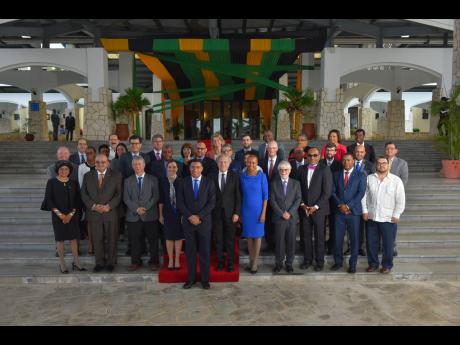Holness: We must be more flexible to global change
WESTERN BUREAU:
With Jamaica poised to improve its standing as an international competitor in the renewable energy sector, Prime Minister Andrew Holness is urging local interests to become flexible and adaptable to global changes so that potential difficulties can be transformed into opportunities for development.
“We must be ready, not only for the unpredictable nature of climate events, but also for the impact of pandemics and civil strife and unrest in far places, which influence global markets and fuel speculative market behaviour,” said Holness in his address at Thursday’s opening ceremony for the fourth Energy and Climate Partnership of the Americas (ECPA) Ministerial Meeting in Montego Bay.
“Meeting the resiliency challenges requires a mindset that expects and even embraces disruption, and if we have this mindset, we’re better able to convert risks into opportunities,” added Holness.
The prime minister told the meeting that Jamaica was working to reshape perspectives on resilience.
“In Jamaica, we’re trying to change that mindset, because everyone likes to be in a predictable situation, within their comfort zone. But the world is becoming a very unpredictable place,” Holness added.
“There will be change and disruption, and therefore we have to embrace it and plan for it in all aspects of government, especially in the energy sector.”
The perceived fear of change has previously been cited as a reason for the failure to implement policies that would benefit the Caribbean. During the 39th Conference of Heads of Government of the Caribbean Community in July 2018, Barbados Prime Minister Mia Mottley blamed this resistance for the failure to fully implement the CARICOM Single Market and Economy (CSME) after its launch in 2006.
Holness listed diversification of renewable energy prospects among Jamaica’s efforts to be more flexible in developing growth opportunities.
“In Jamaica, we’ve started the implementation of mechanisms and measures for disaster risk reduction and strategic disaster financing planning. We’re at approximately 18 per cent of our electricity generation coming from renewable sources, but we’ve set ourselves a very ambitious target of having 50 per cent of electricity generation from renewables by 2037,” said Holness.
“Considerable work continues to diversify our energy sources and incorporate more renewable energy sources. The aim is to make the country more resilient in the face of natural disasters and volatility in fuel prices,” he added.

